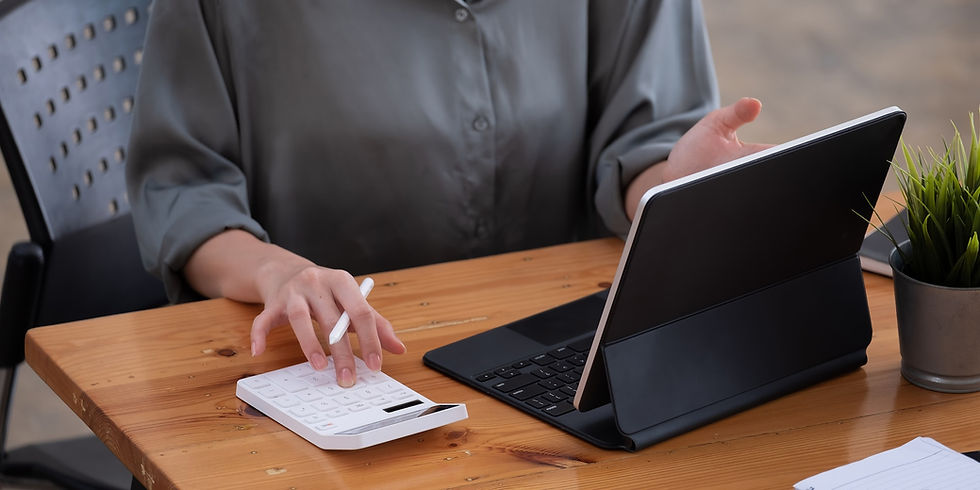Maurice Harary, CEO/Co-Founder, The Bid Lab
- robbarratt4
- Aug 8, 2023
- 5 min read

Maurice Harary is the Co-Founder and CEO of The Bid Lab and took some time out to speak with Rob Barratt from The Industry Leaders about the power and importance of building a personal brand.
Firstly, many people fear the words 'personal brand' as it means going public with your thoughts. I want to know if you have always found it easy to 'put yourself out there'?
Any time you go out into the world truly being yourself that opens you up to being taken advantage of. But there is no success without risk and there is no risk without vulnerability. You will fail. And it’s better to fail as an authentic, vulnerable person because you learn a deeper lesson.
When it comes to building an authentic personal brand, what advice would you give professionals starting out?
There is an old Japanese proverb: “Fall seven times and stand up eight.” Throughout the years as we have continued to expand and grow, there have been inevitable hiccups along the way. The key to overcoming these hiccups is that we EXPECTED them to happen. You have to be prepared for and accept bumps in the road when you are trying to do something great. What’s great is that we always get back up, even if the fall was so hard it sometimes takes a second to heal.
Do you think personal branding and reputation go hand in hand, and what can people do to maintain a positive reputation while brand-building?
As people evolve, they become more sophisticated in their understanding of when and how they are being marketed to. This is why it is more important than ever to be authentic and honest in your advertising. Much like the de-influencer trend on TikTok, many people are looking for more authentic examples of how to live their lives and thus respond to more genuine, human, and even “messy” marketing. Don’t be afraid to add the imperfect or perfectly human into your advertising approach. People make lifelong connections to brands that are relatable and your honest humanity in marketing will be your greatest asset in a world craving more authenticity and less perfection.
Can you share a success story of how you or someone you follow used their personal brand to build business or career?
I’d love to meet Jeff Dean, the head of AI at Google. We use Google products all the time, and we are currently exploring some cool ways to implement AI through our newly launched software. He is brilliant and has been with Google since 1999.
Which platforms do you find most effective for establishing thought leadership and growing professional presence?
Marketing approaches can vary across different cultures; what works in one culture may not necessarily be effective in another. Straight-forward marketing strategies employed in Japan might not work as well as they would in the United States, for example, because Japan is a high-context culture. In high-context cultures, communication tends to be more indirect, and marketing messages may rely largely on visual imagery and symbolism. Meanwhile, in low-context cultures, communication is more explicit. Marketing messages may focus more on the specific features and benefits of a product. The differences don't stop there. Japan has a more individualistic streak, whereas a country like China values collectivistic messaging. Companies will do better marketing personal benefits on an individualistic level than they will in China, where a company would want to think about promoting benefits to society as a whole.
How do you ensure your personal brand stays true to who you are and your evolving goals?
Being authentic and vulnerable opens you up to so many new experiences. If I hadn’t been vulnerable enough to leave a high-paying job at a huge company I would have never taken the risk of starting my own company. And if I hadn’t been my authentic self in starting that company, I wouldn’t have created the business that I have. I work with small and medium-sized businesses that are taking the risk of being vulnerable to expand their opportunities, and I show up for them in an authentic way to really understand their mission and be able to convey that effectively to win them more opportunities. It is my belief that good things don’t come your way if you aren’t willing to take the risk of being vulnerable.
What are some practical strategies or tactics professionals can use to expand their network and build meaningful connections?
1. Founding Clients: We can often get obsessed with finding a large number of clients right off the bat. But in this case, it’s not so much about having a ton of clients as it is about having quality clients. Focus on your client relationships, really understand their needs, and deliver. Making connections with quality clients will generate referrals to grow your business and often they will provide case studies or testimonials you can utilize to draw in more business.
2. Excellent First Hires: Really focus on those first hires you make, ensure they are the right people and you give them a solid foundation. If those first hires get off to the right start, then what’s built under them down the line will scale considerably easier due to the culture and processes built out initially. If you put effort into finding solid employees and bringing them into your company culture, the return on investment will pay off.
3. Support from Family and Friends: It’s impossible to be successful without support. Know who is in your corner and don’t be afraid to reach out when you need help. Whether it’s business advice or just a kind ear after a long day, you need to feel supported to have the energy to keep pushing and create your business.
Along your personal branding journey, have you encountered any common obstacles that readers of this interview should be aware of?
Fear is the number one aspect that holds people back from being authentic and vulnerable. And for good reason. Being vulnerable and authentic takes work and it is scary. It’s been said many times because it is so very true, you can’t let fear win. Often, we are afraid to be who we are in the world because we fear rejection, but it’s far better to be rejected for yourself than for someone you’re pretending to be. And every failure, every rejection just gets you one step closer to success.
Imagine you have a time machine that can transport you to the future. What impact do you envision your personal brand having on the world?
I started this company because I am the best at what I do - winning bids for companies. I wanted to take my talents and use them to help smaller companies win new business. Winning these bids changes the lives of the people who run these companies, their families and their communities. I love knowing that my skill set is helping change lives in impactful ways. There is nothing better than knowing that you are contributing to the overall good.
Close your eyes and imagine you're a bestselling author. What captivating book would you write to share your personal brand journey and insights?
I was greatly impacted by the book The Go-Giver by Bob Burg. That book specifically focuses on taking the attention off of getting and redirecting your intention to giving. It’s a powerful foundational shift.
















